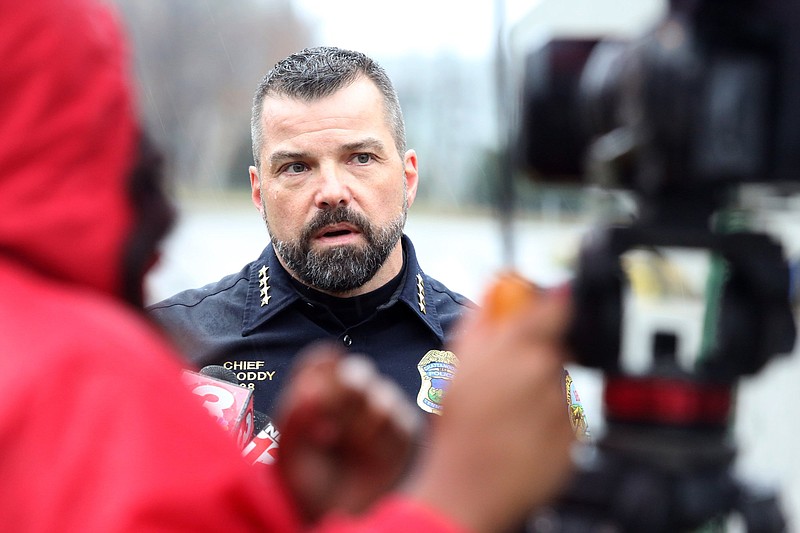When Chattanooga area law enforcement leaders took to social media Wednesday to speak out against the actions of a Minneapolis police officer that resulted in the death of George Floyd, they didn't expect the tweets to reach so many people. But with such a large audience, so has come scrutiny from some calling the tweets hypocritical and pointing to local departments' own cases of alleged police brutality.
Floyd, 46, died after being handcuffed and pinned for several minutes beneath Minneapolis police Officer Derek Chauvin's knee. A widely circulated video shows Chauvin, who is white, holding Floyd, who is black, down as Floyd complains he can't breathe.
Chauvin has now been charged with murder. But days before that, Chattanooga Police Chief David Roddy spoke up on Twitter.
"There is no need to see more video," Roddy said on Twitter. "There no need to wait to see how "it plays out". There is no need to put a knee on someone's neck for NINE minutes. There IS a need to DO something. If you wear a badge and you don't have an issue with thisturn it in."
The tweet went viral, with more than 152,000 retweets and 622,000 likes as of Saturday morning.
There is no need to see more video. There no need to wait to see how “it plays out”. There is no need to put a knee on someone’s neck for NINE minutes. There IS a need to DO something. If you wear a badge and you don’t have an issue with this...turn it in. pic.twitter.com/frNCAWCeq6
— David Roddy (@ChiefDavidRoddy) May 27, 2020
Hours later, Hamilton County Sheriff's Office Chief Deputy Austin Garrett also weighed in, tweeting that, "As leaders our communities must know where we stand. This act of violence is black & white. Make no mistake, there's no explanation or gray in it. For 8 min George Floyd lay suffocating and dying. If you wear a badge stand up for what's right & stand up & speak out against wrong."
The tweets have garnered extensive support and praise. But some have called the chiefs hypocritical for not speaking out about problems within their own departments.
In a public Facebook live video, local rapper and activist Cameron "C-Grimey" Williams asked where Roddy was "when a CPD officer was accused of raping women on duty."
"Did Chief Roddy tweet that that was horrible?" Williams asked, referencing former Officer Desmond Logan, who resigned just minutes before his disciplinary hearing and has pleaded guilty to two counts of deprivation of rights for raping three women in his custody and using a Taser on a fourth woman.
Roddy did condemn Logan's actions, although after Logan admitted to the crimes.
"Desmond Logan is not what the men and women of the Chattanooga Police Department represent," Roddy said at the time. "He is an absolute disgrace of a police officer and a human being. His abominable actions tarnish the badge we all proudly wear and diminishes trust so many officers work hard to build every day."
Williams pointed to another case, that of a 14-year-old black girl whose wrists reportedly needed splints after she was pulled out from behind the wheel of a running vehicle in June 2018 by a white Chattanooga police officer. She was arrested while her mother left for a short time. Police had been asked to intervene by a car repossession agent who was trying to seize the vehicle. At the time of the incident, Roddy said the force used by the officer was in compliance with the department's use of force policy and training.
Another case mentioned is the filmed beating of local rapper Charles Toney Jr. by a Hamilton County deputy during a December 2018 arrest. District Attorney Neal Pinkston asked the U.S. Department of Justice to investigate. It's not clear where that investigation stands.
Another case involved two sheriff's deputies - one of whom has since resigned and been indicted on 44 criminal charges - who were seen in dashcam footage punching, kneeing and apparently performing a body cavity search of a handcuffed black man on the side of a Soddy-Daisy road. Black community leaders and clergy gathered at the Hamilton County Courthouse to call for Sheriff Jim Hammond's resignation
"Where was the tweets then?" Williams asked.
"You don't get no cookie point for stating out the obvious because you were not there when that young girl was getting snatched out of her car," he said. "You were not there when those Hamilton County sheriffs raped a man on camera. And you were not there when they beat [Toney] while he was in handcuffs."
Similar comments have been posted across Facebook, Reddit and Twitter.
So why did the chiefs condemn the actions of the Minnesota police officer but not their own?
"When an incident occurs in your own department, you must balance many concerns such as the need for fact finding, pending internal investigations, pending criminal investigations by different agencies, application of departmental policies, certain state and federal laws and most importantly, the due process rights of their employees," said attorney Bryan Hoss, whose firm often represents officers who are members of police unions.
Much like with criminal investigations against citizens, law enforcement leaders' comments could taint an investigation, a jury pool - which could violate the accused's constitutional right to a fair trial - and, with officers, that could lead to a fired officer getting his or her job back.
"A [chief's] public comment about a case within their own department can lead to an accusation that they infringed on the due process rights of their employees by reaching a conclusion prior to a thorough investigation of the facts," Hoss said. "It can also influence a jury who ultimately decides the facts in a case. A public comment after a public plea of guilty for instance is very different and can be appropriate."
Even if there aren't criminal charges in a case of alleged police misconduct, "If I come out on the front end with a presupposed notion of what occured, and then I make a decision that is in line with that original statement, that could very well damage our ability to make discipline stand under an appeals process," Roddy said.
"A chief that has to make the final decision is in a bit of a position where, regardless of how they feel, they have to maintain their objectivity," he said. "It's not a personal decision."
"You may feel a certain way as a leader in a law enforcement organization, but taking action on those feelings - you have to wait until the end of the process and maintain your objectivity so that your final decision can stand If you're overturned, then you are obligated to bring that officer or officers back onto your force."
That, in part, is what happened in the 2012 beating of Adam Tatum that left him with multiple breaks in both legs.
Video of the incident sparked public outrage, and after an internal investigation, now-retired Chattanooga police Chief Bobby Dodd fired officers Sean Emmer and Adam Cooley. The officers appealed the firing and were reinstated.
Emmer and Cooley, who were represented by Davis & Hoss, P.C., then sued the city in federal court for employment discrimination. Among other things, the officers alleged that Dodd's public comments - made after the firing of the officers but during the criminal investigations and before the officers' appeal hearing - "imposed an untrue and unjust stigma upon Officers Emmer and Cooley" and "have effectively denied them the freedom to take advantage of other employment opportunities."
The suit was ultimately dismissed after the city struck a deal with the officers in an effort to keep them off the force. But it came at a price: The city agreed to pay $88,000 total to the two officers and rehire them so that they could then resign. That way, they could keep their law enforcement certifications and continue working in law enforcement if they so chose. And if a future employer contacted the city about Emmer and Cooley, officials would only be allowed to give the dates the officers were employed and when they resigned.
With Roddy and Garrett's tweets, though, "there is a luxury afforded to someone" who is not involved in an investigation. Roddy took advantage of that, he said, to "give my officers and this city an understanding that putting your knee on someone's neck for nine minutes is not approved," Roddy said. "It's never been taught. It's not allowed, and I cannot even paint a proposed scenario that would make that justified."
Garrett echoed Roddy's sentiment, adding that "it is important that people in our community know where we stand."
"There may be times when we as law enforcement leaders wish we could be more vocal in incidents of alleged wrongdoing that directly affect our agencies. However, we are sometimes limited by policies and in some cases, even the laws of this state," he said.
"The comments I made were on my personal page and pertained to an incident that did not occur in our jurisdiction nor is under investigation by our agency. Therefore, as a citizen, even as Chief Deputy of the HCSO, [Tennessee Rules of Professional Conduct] did not apply allowing me the ability to comment."
Both Roddy and Garrett said they felt obligated to address the incident.
"I would love to say that I sat in my kitchen typing that tweet, thinking that it would cause some type of change or direction for an industry - a profession that I hold very dear - and our country. But that wasn't where I was headed," Roddy said. "I saw something that caused me great concern and sadness at the actions of a few, and I felt obligated to simply let my officers and my community know what I felt about that personally, full-well knowing that I did not have the obligation that [the Minneapolis] police chief has to maintain his objectivity."
As for their own departments, the two men said they take accusations against their own "seriously and investigate them thoroughly" and take the appropriate action "if an employee's actions are found to be inconsistent with our training, our policies, or the applicable laws of this state," Garrett said.
For both Chattanooga police and the sheriff's office, sometimes that has resulted in the firing of an officer or an officer resigning prior to termination.
"We are doing everything we can within our policy and due process to address those that have shown problematic behavior and to move them out of our police department while still making sure that we respect the good officers here so that they feel supported in their jobs," Roddy said.
Contact Rosana Hughes at rhughes@timesfreepress.com or 423-757-6327 with tips or story ideas. Follow her on Twitter @Hughes Rosana.

